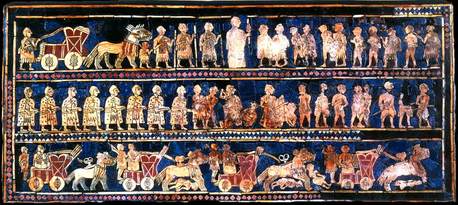| Mr. Veldman's Class |
|
Unit 3-Ancient Mesopotamia
Ancient Mesopotamia Unit Objectives
7-W3.1.1-Describe the characteristics that classical civilizations share such as institutions, cultural styles, and systems of thought that endured for several centuries.
7-W3.1.2-Using historic and modern maps, locate the major empires of this region, describe their geographic characteristics, and propose a generalization about the relationship between geographic characteristics the development of early empires.
7-W3.1.3-Compare and contrast the defining characteristics of a city-state, civilization, and empire.
7-W3.1.5-Describe the major achievements of the empires in this region in the areas of art, architecture, science, technology, political ideas, philosophy, and military strategy.
7-W3.1.6-Use historic and modern maps to locate and describe trade networks among empires in this, and other regions.
7-W3.1.7-Use a case study to describe how trade integrated cultures and influenced the economy within empires.
7-W3.1.8-Describe the role of state authority, military power, taxation systems, and institutions of coerced labor, including slavery, in building and maintaining empires.
7-W3.1.9-Describe the significance of legal codes, belief systems, written languages, and communications in the development of large regional empires.
7-W3.1.10-Create a time line that illustrates the rise and fall of classical empires during the classical period.
7-W3.1.2-Using historic and modern maps, locate the major empires of this region, describe their geographic characteristics, and propose a generalization about the relationship between geographic characteristics the development of early empires.
7-W3.1.3-Compare and contrast the defining characteristics of a city-state, civilization, and empire.
7-W3.1.5-Describe the major achievements of the empires in this region in the areas of art, architecture, science, technology, political ideas, philosophy, and military strategy.
7-W3.1.6-Use historic and modern maps to locate and describe trade networks among empires in this, and other regions.
7-W3.1.7-Use a case study to describe how trade integrated cultures and influenced the economy within empires.
7-W3.1.8-Describe the role of state authority, military power, taxation systems, and institutions of coerced labor, including slavery, in building and maintaining empires.
7-W3.1.9-Describe the significance of legal codes, belief systems, written languages, and communications in the development of large regional empires.
7-W3.1.10-Create a time line that illustrates the rise and fall of classical empires during the classical period.

